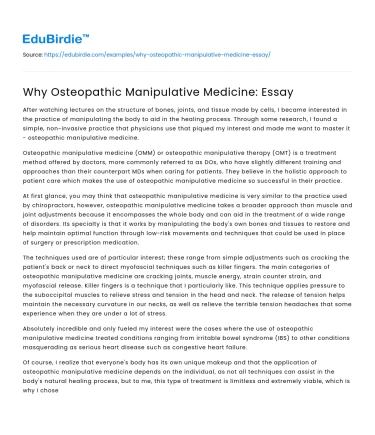After watching lectures on the structure of bones, joints, and tissue made by cells, I became interested in the practice of manipulating the body to aid in the healing process. Through some research, I found a simple, non-invasive practice that physicians use that piqued my interest and made me want to master it - osteopathic manipulative medicine.
Osteopathic manipulative medicine (OMM) or osteopathic manipulative therapy (OMT) is a treatment method offered by doctors, more commonly referred to as DOs, who have slightly different training and approaches than their counterpart MDs when caring for patients. They believe in the holistic approach to patient care which makes the use of osteopathic manipulative medicine so successful in their practice.
Save your time!
We can take care of your essay
- Proper editing and formatting
- Free revision, title page, and bibliography
- Flexible prices and money-back guarantee
At first glance, you may think that osteopathic manipulative medicine is very similar to the practice used by chiropractors, however, osteopathic manipulative medicine takes a broader approach than muscle and joint adjustments because it encompasses the whole body and can aid in the treatment of a wide range of disorders. Its specialty is that it works by manipulating the body's own bones and tissues to restore and help maintain optimal function through low-risk movements and techniques that could be used in place of surgery or prescription medication.
The techniques used are of particular interest; these range from simple adjustments such as cracking the patient's back or neck to direct myofascial techniques such as killer fingers. The main categories of osteopathic manipulative medicine are cracking joints, muscle energy, strain counter strain, and myofascial release. Killer fingers is a technique that I particularly like. This technique applies pressure to the suboccipital muscles to relieve stress and tension in the head and neck. The release of tension helps maintain the necessary curvature in our necks, as well as relieve the terrible tension headaches that some experience when they are under a lot of stress.
Absolutely incredible and only fueled my interest were the cases where the use of osteopathic manipulative medicine treated conditions ranging from irritable bowel syndrome (IBS) to other conditions masquerading as serious heart disease such as congestive heart failure.
Of course, I realize that everyone's body has its own unique makeup and that the application of osteopathic manipulative medicine depends on the individual, as not all techniques can assist in the body's natural healing process, but to me, this type of treatment is limitless and extremely viable, which is why I chose to become a specialist in this field.






 Stuck on your essay?
Stuck on your essay?

